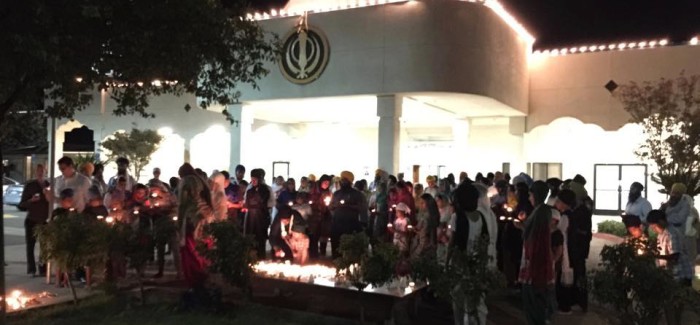Hundreds Attend Fresno Vigil for Hunger-Striker and His Slain Son-in-Law
“Put pressure and bring awareness in this country,” urge Sikh community leaders
Fresno, CA: Sept. 8, 2015 — “We should remember the legacy of Satwinder as a martyr,” said Steve Macías on Sunday at a candlelight vigil held in Fresno, CA in memory of the late Satwinder Singh Bhola and his hunger-striking father-in-law, Surat Singh Khalsa.
Bhola was brutally slain in Peoria, Illinois on August 16. The suspicious circumstances of his murder, in which his throat was cut and cash on his person was left untouched, have led many supporters of his family to speculate that it was a politically-motivated attack in retaliation for Khalsa’s extended hunger-strike protest. Khalsa, a U.S. permanent resident from Lathrop, CA, traveled to Punjab, India in January to begin his protest in demand for release of Indian political prisoners who have completed their sentences but are not being released.
Speaking to hundreds gathered in honor of the two Sikh activists at Gurdwara Gur Nanank Prakash, Fresno, Macías noted that the word “martyr” means witness. “Much like a witness in a court-room. Somebody who bears the truth on their own conscience.” Referencing his work with Organization for Minorities of India (OFMI) to bring awareness to the issue, he warned: “Unfortunately, it seems that the Indian government is ready to create another martyr, and his name is Bapu Surat Singh Khalsa.”
“The way Bapu Surat Singh has been treated is a crime, but the bigger crime is the way the political prisoners have been thrown in jail,” said Dr. Sharnjit Purewal, Associate Secretary of the Sikh Council of Central California. “Now they’re being illegally jailed. First of all, the law that was passed to jail them was an undemocratic, unjust law that gave the police and the military undue power, which should never happen in a democracy. But now the government has broken the law and has unjustly jailed these prisoners. They are the ones who we should really be fighting for.”
Since April, nine U.S. congressional representatives from California have publicly appealed to Secretary of State John Kerry to speak on behalf of Khalsa’s human rights campaign. Dr. Purewal encouraged his listeners to ask for more, stating: “I believe there’s a lot that we can still do through our own government, working with our own political leaders. There’s a lot more that we can do to put pressure and to bring awareness in this country to help the situation there in Punjab.”
“Jaswant Singh Khalra was murdered in 1995 and today, September 6, 2015, is the 20th anniversary of his disappearance,” said activist Pieter Friedrich at the vigil. “I want to talk a little bit about the political environment that prevailed in Punjab, India at the time when many of these people who are now political prisoners were arrested and were sentenced…. Jaswant was murdered by the State for uncovering and reporting that death squads of Indian police were secretly rounding up Sikh men in Amritsar and other areas of the Punjab, imprisoning them off the books, torturing them, killing them, and then quietly cremating their bodies at local cremation grounds.”
At present, cautioned Friedrich, “The killings have declined but the same police officers who fielded death squads remain in power in the Punjab.”
In the face of rampant oppression, OFMI Founding Director Bhajan Singh said, “Bapuji is a true soldier of Sikhi. No matter what the price, he and his family will never back down.” Singh saw hope in the mission of Sikhi as he discussed belief systems. Explaining that the Sikh holy book, Guru Granth Sahib, offers unity in its compilation of teachings by over 30 different Mulnivasi personalities, he said this offers a challenge: “Why walk with a bent back? Why walk with a lowered neck? Walk straight. Walk tall.”
Dr. Purewal conveyed a similar message, concluding: “Together, we can accomplish more. There is no doubt that it is the duty of a Sikh to stand up and fight for justice. Whenever there is an injustice, no matter where in the world, no matter who it involves.” Meanwhile, Macías emphasized the need to stand together, noting: “Guru Nanak travelled to China to visit the Buddhists, he travelled to Mecca to visit the Muslims, he travelled to Rome to visit the Vatican to see the Christians because he knew that in the unity of the brotherhood of humankind there is strength.”
Organized by Sikh Youth of California with leadership from Navjot Singh Khalsa, the evening’s program also featured remarks by several young Sikhs, including Mangal Kaur, Jaspreet Singh, and Gurdeep Singh. The evening began with prayers and ended with hundreds of lit candles held high in the air as participants again prayed while standing vigil for Bhola and Khalsa.


